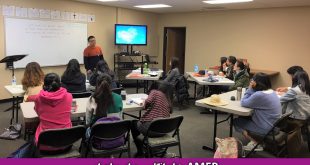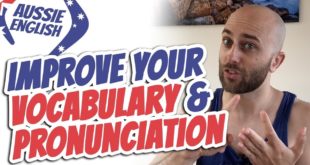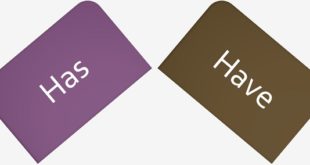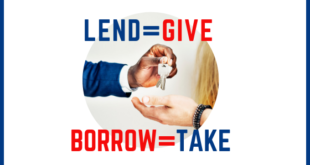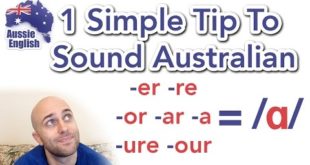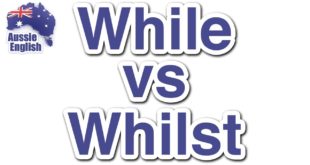In this episode, I teach you how to pronounce “Would Not Have” in its different contraction forms, “Wouldn’t have”, “Wouldn’t’ve” and “Wouldn’ah”.
Note: “Wouldn’t’ve” and “Wouldn’ah” are never written in English. When said they’re still written as “Wouldn’t have”.
Pronunciation – Would not have = Wouldn’t have, Wouldn’t’ve, Wouldn’ah
G’day guys. Welcome to this episode of Aussie English. Today I’m going to do another pronunciation episode, and in today’s episode we are going to focus on the contraction of “Would not have”. And there’s a few different contractions. It gets more and more contracted depending on the speed at which you’re talking. When you’re talking with another native. So, you’ll start with “Would not have” and then you can contract the “Not” onto “Would” so you’ll have “Wouldn’t have”, and then not written but spoken you’ll have “Wouldn’t’ve”, “Wouldn’t’ve”, and then quite often if someone has a really strong Australia accent, I’m not sure about American or English, they could also say it like this but at least in Australia you’ll hear “Wouldn’ah”, “I wouldn’ah”, which is “Would not have”, “Wouldn’ah”.
So, you’ll have “Would not have”, “Wouldn’t have”, “Wouldn’t’ve” and “Wouldn’ah”. So again this episode isn’t necessarily to emphasise that you guys need to speak this way it’s more just to give you exposure to these different ways that “Would not have” is pronounced by natives without them realizing when they speak incredibly quickly so that you can understand what they’re saying when they’re saying it without having to ask them to repeat it and you’ll know instinctively.
So, I should probably cover first when and when not to contract “Would” onto the pronoun beforehand, such as, “I would”, “He would”, “She would”, “We would”, “They would”, it often becomes “I’d”, “You’d”, “He’d”, “She’d”, “We’d”, “They’d”, sometimes you don’t contract the “Would” because there are other words following “Would” that are contracted, and it just gets too messy and I think as a native speaker who listens you would just miss too much of the message if all of those words are contracted. For instance, if you have “Would not have” you can contract all of those words in different cases but because you’ve got three in a row it would be “I’dn’t have” or “I’dn’t’ve” and it’d be very weird. You wouldn’t really get the message. So, any time you negate the sentence, that is it’s in the negative, you use the word “Not”. So, “I would NOT have”, “I would NOT have done”, “I wouldn’t have time”. Any time the “Not” is in the sentence and it’s negated, it’s in the negative, you don’t contract “Would”, at least as far as I know it sounds incredibly bizarre when I try and um… think about saying “I’dn’t have” or “I’dn’t’ve”. It’s just not… it’s not said. So, don’t focus on that. But yeah, the little cheat is if it’s negated, if there’s a “Not” in there, you would have “Would” as it’s full word and then you would contract either or both “Not” and “Have” onto “Would” after the word. So, for example, “I would not have done that” can become “I wouldn’t have done that” or it can become “I wouldn’t’ve done that”. So, that was the conditional past tense but if it was just in the conditional then you would have “I wouldn’t have time”, “I wouldn’t have chocolate”, “I wouldn’t have that much to say”, etc. So if there’s a “Not” don’t contract “Would”.
Anyway, let’s get to some examples. So, say for example when talking about going to a party if, say, someone made you go to the party and they thought you didn’t have a good time you could say, “I wouldn’t’ve come if I didn’t want to”. So, even though that person is worried you didn’t have a good time you can say, “No no no no no, it’s fine.” You know, “If I didn’t want to come I wouldn’t’ve”. So, “I wouldn’t’ve come if I didn’t want to”, “I wouldn’t’ve gone if I didn’t want to”, “I wouldn’t’ve come if I didn’t want to”.
If someone’s moving house and you’ve offered to help the person move house and it turns out that moving has been a lot more work than that person anticipated before asking you to do it, and so, you say, uh…. spend the entire day pack their things, helping them move, unpack at the new house, and it takes a lot of your day up, the person could say to you “Oh look I’m sorry it took so long” and you could say, “If I didn’t want to help I wouldn’t’ve”. “If I didn’t want to help I wouldn’t’ve”.
Another example could be a couple go out on a first day and one of them is an incredibly busy person and has to rush to the date straight after work, you know, they… they’ve got to get the tram, they’re running effectively because they’re worried they’re going to be late, because of their busy schedule, and the other person might say “Oh… sorry we probably should’ve chosen a better day. Today was obviously a bad one for you.” And you could say, “No no no no. It’s fine. I wouldn’t’ve come if I’d been too busy”. “I wouldn’t’ve come if I didn’t want to come”. “I wouldn’t’ve come. But it’s fine. I wanted to come so I came.”
One last example could be that someone could say something to another person who gets confused and asks “Are you sure that’s what you meant to say?” and you could say in response “Yeah, I wouldn’t’ve said it otherwise”. “Yeah, I wouldn’t’ve said what I said if I didn’t meant it or if I didn’t want to say it. I wouldn’t’ve said it if I didn’t want to. I wouldn’t’ve said it if I didn’t want to”.
Note: Neither “Wouldn’t’ve” nor “Wouldn’ah” is ever written in English. Even if said this way when speaking, it’s always written as “Wouldn’t have”.
So, now let’s do a little conjugation exercise guys where I’ll just conjugate the conditional past tense, and I’ll go through the different contractions as they get progressively more and more contracted. So, listen and repeat after me.
I would not have…
I wouldn’t have…
I wouldn’t’ve…
I wouldn’ah…
You would not have…
You wouldn’t have…
You wouldn’t’ve…
You wouldn’ah…
He would not have…
He wouldn’t have…
He wouldn’t’ve…
He wouldn’ah…
She would not have…
She wouldn’t have…
She wouldn’t’ve…
She wouldn’ah…
We would not have…
We wouldn’t have…
We wouldn’t’ve…
We wouldn’ah…
They would not have…
They wouldn’t have…
They wouldn’t have…
They wouldn’ah…
So, we’ll do some more listen and repeat exercises here guys because I want to put these contractions into sentences with context around them so that you have a better way of remembering and understanding how and when you would use these different phrases.
So, the setup here for the phrases that I’ll go through afterwards is that someone invites you to a party and it’s inconvenient for you because you’ve got a really busy schedule but you make the effort to go to the party anyway. So, when you arrive they say to you, “Oh I know you were so busy. You should’ve just said you couldn’t make it, you know. Like, I realise you were busy and had other things to do, and that it was quite an effort for you to come. So, you should’ve just said, “Sorry I couldn’t make it.”” And then you could say, and repeat after me.
I wouldn’t’ve come if I didn’t want to.
You wouldn’t’ve come if you didn’t want to.
He wouldn’t’ve come if he didn’t want to.
She wouldn’t’ve come if she didn’t want to.
We wouldn’t’ve come if we didn’t want to.
They wouldn’t’ve come if they didn’t want to.
And now we’ll just go through some random sentences. So, again some listen and repeat exercises here, but this time I’ll say “Wouldn’ah” instead of “Wouldn’t’ve”. So, you get an opportunity to use both.
I wouldn’ah gone if I couldn’ah
I wouldn’ah come if I couldn’ah.
You wouldn’ah asked if you didn’ wanna know.
You wouldn’ah been much older than me.
He wouldn’ah shown up if he didn’t wanna.
He wouldn’ah stayed if he didn’t wanna.
She wouldn’ah been awake that late last night.
She wouldn’ah arrived by that time.
We wouldn’ah played football even if you’d paid us.
We wouldn’ah gone to bed much later than 10.
They wouldn’ah ever wanted to know.
They wouldn’ah seen you I’m sure.
So, you’ll notice int here also guys, I’m sure if you go back, that I also contracted a few other things like “Couldn’t have” I turned into “Couldn’ah” um… “Didn’t want to know” I turned into “Didn’ wanna know”, and there’s a few other ones in there. But again it’s just listen and repeat, practice this pronunciation stuff here guys. If you have a bit of an issue understanding what these sentences are saying when I speak with a really strong accent with a lot of contractions jump on the website, I’ll have for these episodes the transcript out so you can read it and then practice your pronunciation and this hopefully is going to really help you in understanding when other native Australians, and other native speakers as well who use these contractions, speak to you, you’re going to know exactly what they’re saying straight away. So, you’ll pick up on it, you’ll have heard it before when listening to these episodes and it’ll be like “Oh I remember that! Boom! It’s all good I understand.”
 ایرانیان استرالیا Australia Iran بزرگترین جامعه ایرانیان ساکن استرالیا Australia Iran
ایرانیان استرالیا Australia Iran بزرگترین جامعه ایرانیان ساکن استرالیا Australia Iran


